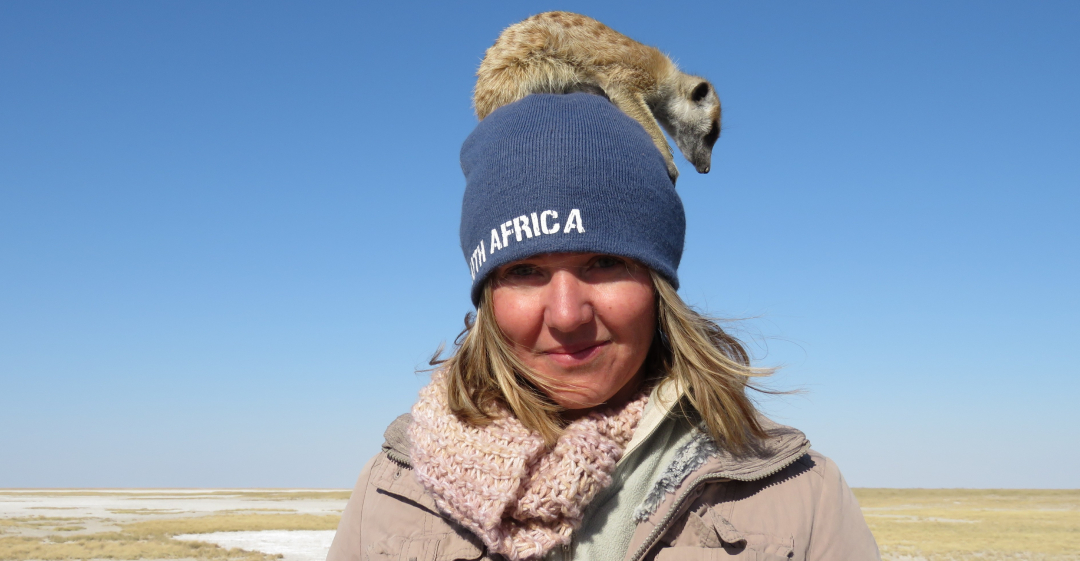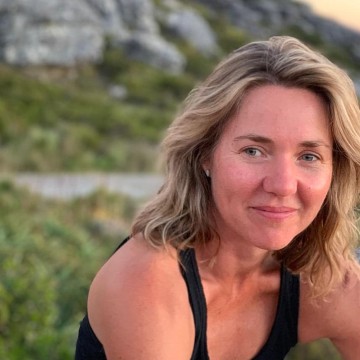“I couldn’t imagine doing anything else, ever. But then lockdown hit.”

What work were you doing previously?
I was in the travel industry.
Specifically African safari – an industry that I absolutely adored. I couldn’t imagine doing anything else, ever.
But then lockdown hit, and with it came the travel bans. My industry went into a complete loop.
What are you doing now?
I’m a freelance marketing consultant.
It’s the same kind of work I was doing in safari, but I’ve transferred those skills into other spaces, such as education.
Why did you change?
When the pandemic hit, my income went overnight.
I had an 88% drop. Marketing is very much a fixed cost, so when the companies in my industry were looking to save money, they had to drop my hours.
I went into a bit of a tailspin. When you love something so much, and you can’t imagine doing something else, it’s totally overwhelming.
But I had to earn money – I couldn’t live on 12% of my income for the rest of my life. I was sitting at home one night, in lockdown, and I googled 'How to change career', because I didn’t know what the hell else I was going to do.
How did you choose your new career?
I was always very reluctant to think about being a freelancer.
You hear stories about 'feast or famine', and people not paying invoices. So I didn’t really choose this; it just naturally happened under the circumstances of the lockdown.
Also it kind of happened organically. In a way, that took a lot of pressure off – I didn’t make a big decision; I just allowed things to evolve.
Are you happy with the change?
I would much prefer that the travel industry was healthy, and that people were safe to travel, but I'm pleased that I now know I can support myself outside that industry.
Plus I’m really happy that I’ve renewed relationships with people I worked with in the past, and that I’ve learned new skills and new industries.
What do you miss and what don't you miss?
I still have a passion for wildlife and travel.
But just because you have a passion for one thing, doesn’t mean you can’t develop a passion for another.
How did you go about making the shift?
I took part in the Careershifters Career Change Launch Pad.
One of the lessons I learned on the Launch Pad was to stay in touch with people and build up your network.
I’ve always stayed in touch with people I worked well with in the past. Some of those people have got in touch with me, asking me to do work – I’m very lucky.
Over the past year, two former bosses who went into different industries got in touch with me. I felt pleased about that – it’s flattering.
I went into industries that I knew very little about, like contractor recruitment and HR. But I found it completely fascinating to delve into this world that was totally foreign to me – it was so interesting.
I think that’s a key thing – you’ll find your shift easier if you’re curious about the world, if you’re a little bit of a generalist.
What didn’t go well? What wrong turns did you take?
Surprisingly enough, I did a job that I thought was going to be absolutely spot on, because it was connected to safari.
I thought, "Great, everything's going to come up roses".
But it was very difficult! Although it was the industry I loved, I couldn’t easily adapt to the way of working in that particular team.
What this made me realise was that, at the end of the day, it’s not necessarily all about the industry per se – it’s also the broader team, what the environment is.
How did you handle your finances to make your shift possible?
Once again, I was quite lucky: I was on a relatively good salary, I don’t have dependants, and I own my own house.
So, when I took that 88% drop in income, I was able to cut out a lot of unnecessary expenditure.
I got in touch with my financial advisor, who gave me incredibly sound advice. It’s so worthwhile getting that professional outside opinion.
And I was really open with friends and family – I said to them, "Look, I can’t do this as I literally don’t have the money." If you’ve got true friends, you mustn’t be embarrassed about that.
What help did you get? 
I asked my friends and family, "If you hear of a job, please let me know."
People were sharing their network and ideas with me – the help I got was amazing. And it was even more amazing because I asked for it. Sometimes it’s that old thing: you get what you ask for.
What have you learnt in the process?
It’s taught me that there is life beyond safari, I do have other talents, and there are other things I can do.
I can take my talents and interests and shift them to another industry quite easily and quite successfully.
What do you wish you'd done differently?
It would be easy to say that I wish I’d been more proactive and put myself out there more, or that I wish I'd spent more time on Upwork and LinkedIn. But that’s not my natural personality.
Lockdown was such a weird and unique situation. I don’t think I regret a hell of a lot. Things turned out relatively OK, and I was very, very lucky.
What would you advise others to do in the same situation?
There’s this crazy hustle culture out there that says that if you’re sleeping for more than four hours a night you’re wasting your life; if you’re reading a book for pleasure you’re an idiot; you should be starting your own business…
I just can’t be doing with that stuff, I find it frightening and overwhelming. I don’t like this idea that if you’re not doing something all the time, you’re failing.
We need time just to zone out.
I often find that if I’m in a bit of a pickle, I go for a walk. Your brain frees itself to think through solutions and come up with plans – during the walk the answer will come to you.
And you'll always feel better afterwards.
What lessons could you take from Angela's story to use in your own career change? Let us know in the comments below.
Angela took part in our Career Change Launch Pad. If you're ready to join a group of bright, motivated career changers following a structured process to help you find more fulfilling work, you can find out more here.



